Stop Wasting Time! Here’s How to Clean Windows Right?
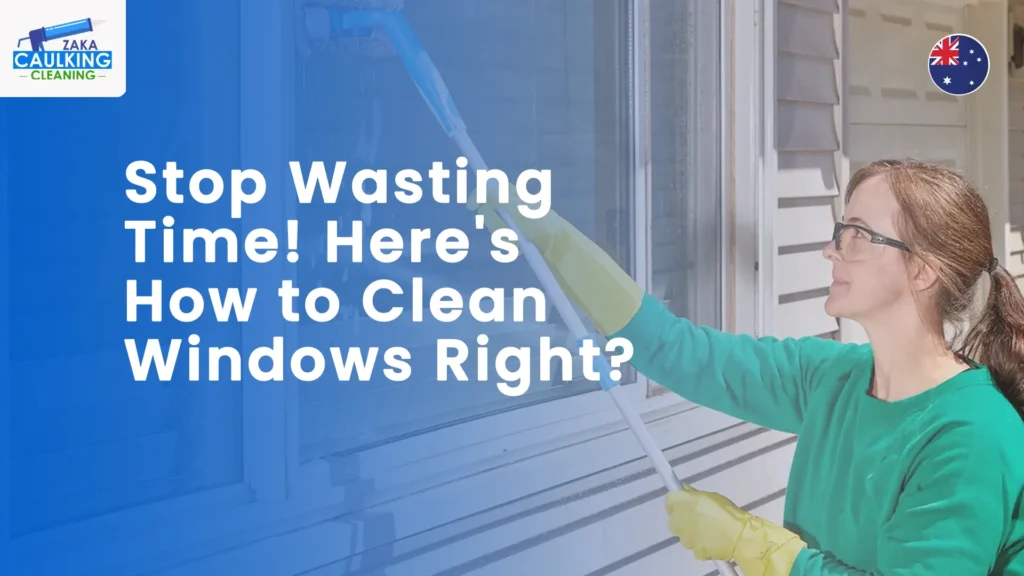
Tired of dull, streaky windows, no matter how much you clean? Discover how to clean windows the right way with expert tools, water tips, and safe tint removal methods for crystal-clear shine every time. Transform your view with these simple secrets!
Why Businesses Should Invest in Commercial Window Cleaning?

Learn how regular commercial window cleaning in Sydney enhances your business’s curb appeal, employee health, and long-term savings. From natural light to protecting your property’s value, find out why clear, shiny windows make the first impression.
Professional Bathroom Caulking Services: When DIY Isn’t Enough
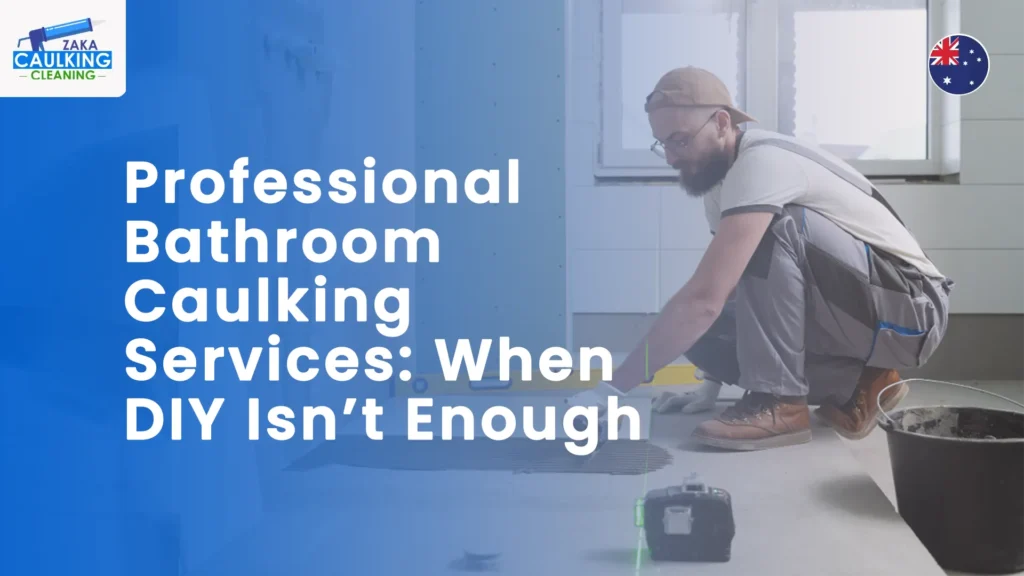
Bathroom caulking plays a crucial role in preventing leaks, mold, and structural damage. Professional sealing ensures durable protection, clean finishes, and a healthier space. With the right materials and tactics, your bathroom stays strong and waterproof.
Builders Clean Window Cost: What to Expect in 2025
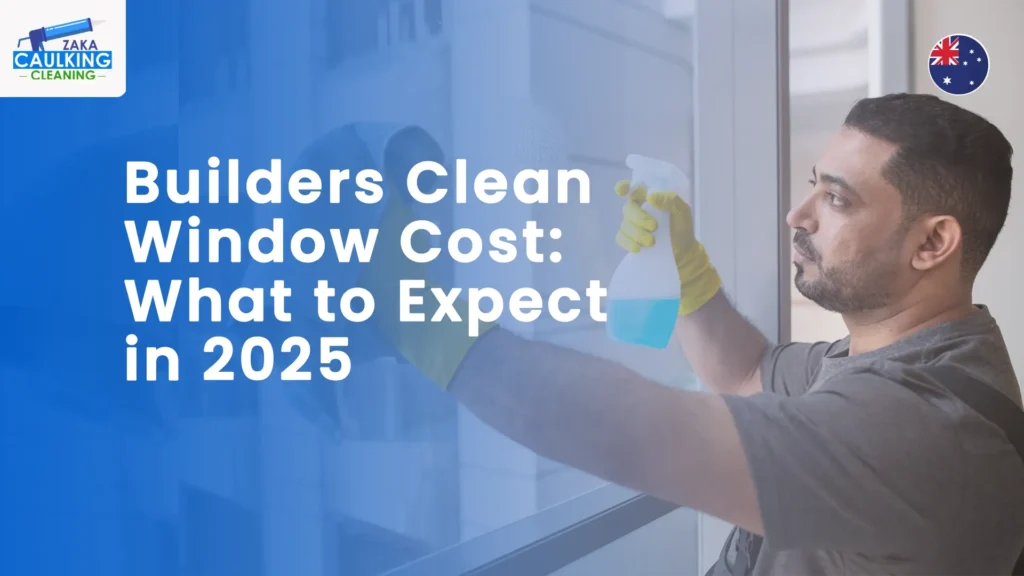
Know everything about builders clean window services in 2025. It includes cost and price factors, residential vs commercial variances, budget saving tips, and expert advice for a flawless finish. Make every window sparkle by using the best cleaning agent. Almost 87% of new construction or remodeling projects leave windows dirty with harsh construction residue. These are like paint spots, cement dust, glue marks, and dirt. If you can’t fix it, this will look ugly. Also, it may harm your glass permanently and make your place less appealing before it shines. In this case, builders clean window service will be a game-changer. As compared to regular cleaning, this is a specialist process after the construction. In this, industry-safe materials, skilled tactics, and precision tools are used to remove stubborn stains. It will make the glass free from stains and streaks, and give your flawless space back. Additionally, clean window shields your area from scratches, stains, or fading that cost you more in the future. Further, you will see in this article what to expect from the builder window clean service in 2025. It covers price ranges, cost concerns, and smart money-saving tips. No matter whether you have a large commercial project or a newly built house. Knowing the numbers early guarantees better choices and a good view. Let’s first check in detail what’s builder’s clean window is! What is a Builders Clean Window? A newly built or refurbished property must have clean and shiny glass. However, it does not deserve windows with cement, paint, or dirt. A builder’s window cleaning service assures a deep cleanup, accuracy, and a perfect finish that makes your room look new. 1. Clear Definition A builder window clean service means an expert cleaning remedy for after construction or refurbishing sites. It focuses on the removal of buildup waste that normal cleaning can’t remove. These are like paint spray spots, silicone leftover, cement stains, and glue marks. In simple words, restoring glass surfaces to their real clean look is the aim. 2. When It is Needed Usually, this service is required right after large repairs or rebuilding. Windows often come into contact with paint drips, sealants, and plaster dust while construction work is going on. Moreover, a finishing clean ensures that these wastes are safely removed prior to their hardening. These will protect the glass and provide your area with the perfect look that lasts. 3. What’s Included A full-service builders clean window package involves various things. These are silicone and paint removal, frame repair, flawless polishing, and complete glass cleanup. Additionally, experts also make sure windows are totally free and check for any residues or scratches. It will improve natural light and the property’s full appearance. Furthermore, the goal of builders’ cleanup is not only to remove dust, but also to enhance the appearance of your area. With professional care, your investment will be better secured, and your windows will shine more. Are you concerned about the window cleaning cost? If yes, the next section can clear all your doubts. Let’s check it! Average Builders Clean Window Cost Transparency is crucial when it comes to after-buildup cleaning budgeting. However, the cost of a builder’s clean window varies. These are based on the type of space, location, and project size. You can make better plans and avoid emergency surprises if you are aware of these cost trends. 1. Pricing Range Homeowners must budget between $10 and $25 per window for living houses on average. On the contrary, the average price per window for large or more complex commercial premises varies from $20 to $40. Hourly prices will range from $45 to $80, mainly for high-access or specific areas. Additionally, some companies provide project-based pricing. It means it is perfect for comprehensive after-construction packages. 2. Residential VS Commercial In general, residential work is easy, requires fewer tools, and takes less time, which lowers charges. But commercial tasks need more safety checks, high-rise access, and wider glass surfaces. Both the overall cost and the labor numbers are instantly increased by these factors. For large-scale upgrades, the extra expertise gives a more flawless and lasting finish. 3. Regional Differences The area of the property may also affect the price. For minor tasks, a builders cleaning services Melbourne starts at about $200. Meanwhile, due to more demand and labor costs, builders cleaning services Sydney are often a little expensive. Your estimate will be realistic and accurate if you take your area into account. To put it briefly, knowing the size, kind, and location of your property supports good budgeting and wise investing in quality cleanup services. Factors that Affect the Cost For good reason, not every builder offers the same prices for window cleaning services. A lot of crucial elements can affect the final cost. You may avoid last-minute surprises and make wise financial decisions if you are aware of things beforehand. The following are some of these factors that may affect the cost: Size and Number of Windows: The labor, time, and cleaning solution needs increase with the number of windows. Planning, longer schedules, and many cleaners are often required for large living houses or company facades. As scope and labor increase with each extra layer, this directly affects the cost of the builder’s clean window. Type of Glass & Access Difficulty: High-rise or unique glass requires more work to clean than basic windows. Hard-to-reach places need framework, lifts, or rope systems that increase risk and labor costs. This is why professional building cleaning crews are vital. Use of Specialized Tools or Cleaning Products: Dealing with post-buildup debris requires more than just easy fixes. It includes wastes like silicone, glue, or paint overspray. Moreover, experts use eco-safe solvents, scrapers, and modern tools to restore shine. More specialized approaches are needed for tough residues. It will affect the final cost and time to do the task. Additional Services: Add-ons like frame detailing, dent repair, or emergency window cleaning services can take the quality to a higher level than just regular
How to Choose the Right Caulking Service Near Me?

Do you want to protect the comfort of your house and stop leaks? More than just filling gaps, the right caulking service protects, beautifies, helps you save money, increases energy efficiency, and keeps your house looking perfect all year long! Do you think caulking is a small home maintenance task? But you will need to hire the best caulking service. It is to protect your property from water damage, air leakages, and energy loss. However, you will benefit from a professional seal. Due to this, your home looks clean, your interiors are safe, your energy bills are lower, and more. Sadly, a lot of people do not focus on it and end up picking an inexpert contractor. These workers use inferior materials or wrong techniques. This will result in cracks, leaks, and expensive repair work. At Zaka Caulking & Cleaning, we think that every seal ought to be long-lasting. Our professional caulking service gives clean and enduring results for all areas. We use premium materials, careful strategies, and years of experience for windows and exteriors to bathrooms and kitchens. In addition to filling up gaps, we will guard your home or business place against dampness, mold, and energy loss. In short, we make sure that each caulk line enhances the look and strength of your area. Let’s first see some signs that show you need a caulking expert service provider! Signs You Need a Caulking Service Are you unsure about whether you need to call the experts or not? Here are some signs that you must look for: 1. Cracked or Missing Caulk Your home is at risk when caulk starts to peel, crack, or vanish. It can cause humid issues, pests, and air leaks. All these things will result in more energy bills, mold, and building base damage. That’s why you must select an expert caulking service for recaulking on time. In the end, your house or place of business stays sealed and safe at a low cost. 2. Visible Mold or Mildew If you see black spots, mold, or mildew growing around window edges, bathtubs, or tiles, your caulk has probably degraded. This dampness issue may end up in bad smells and poor air quality. So, make an appointment for service of caulking to enhance hygiene, stop further growth, and bring back cleanliness. 3. Air Drafts Near Windows/Doors Do you feel cool air near doors or windows that are closed? It is a signal of caulk deterioration. The energy costs of your heating and cooling systems increase due to these air leaks. Quick draft repairs from home caulking services can improve insulation, keep constant indoor comfort, and lower your energy bills. 4. Water Seeping through Corners Signs of missing or cracked caulk are often found in soft areas. These are near corners, wet walls, or water stains. Leaks may ruin your home or office plaster, wood, and paint if not fixed quickly. You can avoid costly repairs and keep the strong base of your property by working with a professional service provider. Further, routine sealing will maintain your place clean, dry, and eco-safe. But do you know how to pick the right service for caulking? If the answer is no, then check the next section! How to Choose the Right Caulking Service? You can select the right caulking service that guarantees resilience, safety, and long-term savings. This will help you to avoid costly water damage and high energy costs. 1. Check Experience and Expertise The basis for high-quality caulking work is experience. Before picking, check how long they have been in this work and what kind of tasks they excel at. Be it internal, external, or commercial caulking. Moreover, professional caulking specialists know the correct ways for each type of surface, which guarantee better and enduring benefits. A skilled local caulking contractor, like Zaka Caulking & Cleaning, will find the issue quickly and provide clean and smooth surfaces. Further, selecting a crew with expertise will promise accuracy, longevity, and better safety from dampness, leaks, and drafts, which all of these newbie contractors sometimes ignore. 2. Ask About Caulk Materials Used The caulk type has a big impact on how long the seal lasts. High-end materials with various uses include silicone, acrylic, and polyurethane. However, silicone works best in humid areas. On the other hand, polyurethane works best outside. When hiring a local caulking service, you must always ask about the materials and their purpose. Low-cost products require more repairs and break down more quickly. Also, it will save your money up front. Our professionals at Zaka Caulking & Cleaning only apply high-quality sealants that are fit for your home. In the end, this promises versatility, resilience, and lifetime security that keeps your area utterly sealed. 3. Review Past Projects or Photos A reliable local caulking contractor needs to have a good record of happy clients. Before any promise, ask for before and after photos of the previous task to check expertise. You may also look at reviews on any local listings, like Yelp, Google Maps, and other local listings. It means you will get real data on customer service, quality, and resilience. Furthermore, there are reputable caulking professionals, such as Zaka Caulking & Cleaning are available. They prominently show their finished projects and client testimonials to prove their reliable benefits. Examining these samples will ensure that your investment will drive resilient, attractive, and robust results and help you. 4. Compare Pricing and Estimates Although cost is essential, your choice should not depend only on it. You must ask for detailed quotes that include labor, materials, and other vital charges. However, choosing the cheap caulking service is not always about saving money. Sometimes it will result in poor materials or an unskilled team. As a result, it will increase your future repair expenses. In contrast, a seasoned local caulking expert like Zaka Caulking & Cleaning offers clear pricing with no hidden charges. Keep in mind that properly applied caulking will save your money in the long run. It
Proven Tricks for Maintaining a Spotless Space

A spotless space isn’t just for show it’s essential for your well being. From improving air quality to reducing anxiety and preventing health issues, a clean home or office is a foundation for a healthier, happier life. With busy schedules, it’s easy to let dirt pile up, but with a consistent plan, maintaining a spotless space becomes second nature. Whether you’re a first-time renter or a family juggling work and chores, this guide will show you the exact steps to keep your environment spotless without the stress. 1. The Science Behind Spotlessness What does “spotless” really mean? It’s more than surface shine. A spotless space involves eliminating hidden bacteria, allergens, and grime from areas you often overlook. It also means organizing and sanitizing your space in a way that supports better health, mental clarity, and productivity. Spotless vs. Clean vs. Tidy Tidy: No clutter Clean: Visibly dirt-free Spotless: Hygienically pristine & deeply organized 2. The Power of a Cleaning Routine Creating a routine is the single most effective way to make cleaning feel easy. Here’s how to break it down: Daily Tasks Make beds Wipe kitchen counters Tidy clutter Take out trash Weekly Tasks Mop floors Dust surfaces Clean bathrooms Monthly Tasks Deep clean appliances Wash windows Vacuum under furniture 3. Decluttering Comes First Clutter makes cleaning harder. Start every session with a 5-minute declutter: Remove unused items Store essentials neatly Use baskets and containers Cleaning becomes less emotionally and physically taxing when clutter is reduced. 4. A Room-by-Room Guide to Spotlessness Kitchen Sanitize countertops & appliances Clean fridge weekly Empty trash daily ️ Bathroom Disinfect all surfaces Replace towels often Clean drains & tiles Living Room Dust electronics & decor Vacuum rugs & sofas Wipe light switches Bedroom Wash sheets weekly Clean under bed Declutter wardrobes Entryway Shake doormats Wipe doors & knobs 5. Smart Cleaning Tools & Products Invest in: Microfiber cloths All-purpose natural cleaners Squeegees HEPA vacuums To safeguard your health and your space, use sustainable, safe goods. 6. The Hidden Dirt Most People Miss Don’t forget to clean: Behind furniture Baseboards Air vents Window tracks Inside garbage bins A truly spotless space includes all the corners you can’t see. Check out this guide by the Environmental Working Group to find safe, non-toxic cleaners for your home. 7. Speed Hacks for Busy People Set 10-minute timers Clean as you cook Keep supplies in every room Do one room a day These tricks make maintaining a spotless space simple even with a hectic schedule. 8. When to Hire a Pro Sometimes you just need help. Call in professionals if: You’re moving out (for end-of-lease cleaning) There’s mold or pest buildup You need a seasonal deep clean At Zaka Caulking & Cleaning, we specialize in spotless results for both homes and businesses. Allow us to relieve your burden. Final Thoughts: Maintaining a spotless space doesn’t mean obsessing over perfection. It means building habits that support your health and lifestyle. With a routine, smart tools, and the occasional pro help, you can enjoy a cleaner, calmer environment every day. Need support to get your space truly spotless? Visit Zaka Caulking & Cleaning to explore our eco-friendly, professional cleaning services that make your life easier. FAQ: Q: How often should I clean my windows? A: At least every 3 months or more often in high-dust areas. Q: How can I maintain my house clean the quickest? A: A 10-minute nightly tidy-up and a weekend deep-clean session. Q: Do natural cleaners work just as well as chemical ones? A: Yes, when used properly, natural cleaners can disinfect and clean just as well without harmful fumes. Q: How do I stay motivated to clean? A: Keep it quick, use music, and reward yourself after. Q: What’s the #1 cleaning mistake? A: Waiting too long—small messes become big ones.
Proven Window Cleaning Techniques for a Streak-Free Finish
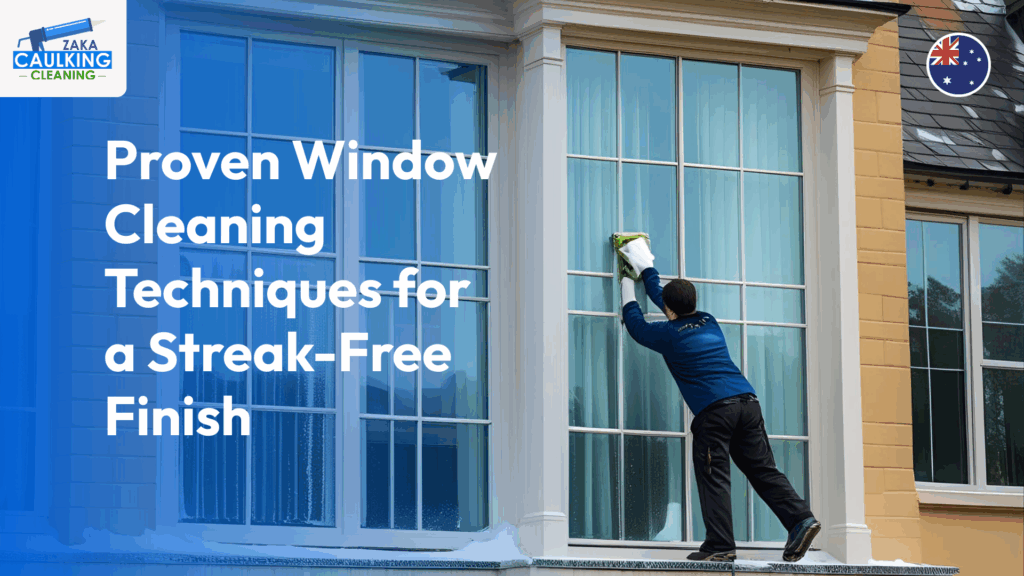
Most people wait until their windows are visibly dirty to take action but by then, the damage is already done. Grime, mineral buildup, and airborne pollutants from traffic or storms can etch into glass, damage frames, and block natural light. In addition to being ugly, unclean windows have an impact on your home’s energy efficiency and mental well being. This is where professional window cleaning techniques come in. Whether you’re working with high rise glass, modern double glazing, or old timber-framed panes, using the right tools, eco-safe solutions, and correct drying methods ensures a lasting, streak-free result every time. 1. Prepare Before You Clean Before anything touches the glass, clean the frame, sill, and surrounding area. Why? Because leftover dust or cobwebs will smear across the pane, defeating the purpose. Tools: Microfiber cloth, soft brush, handheld vacuum Bonus Tip: Pre treat paint splatters or bird droppings with mild soap before wiping. 2. Clean at the Right Time Direct sunlight is your enemy. Why? The solution dries too quickly, leaving behind streaks before you can remove them. 🕐 Best Window Cleaning Time: Early morning or cloudy days. 3. Make Your Own Streak-Free Solution Skip the chemicals go natural. DIY Window Cleaner Recipe: 2 cups distilled water ½ cup white vinegar 1 tsp dishwashing liquid Avoid fabric softeners and paper towels they can leave residue. 4. Use the Right Tools (Not Just Any Cloth) Not all rags are created equal. Tool Use Squeegee For even, streak-free wipes Microfiber cloth Traps dust, perfect for drying Extendable pole Safe for high windows Steam cleaner Eco-safe sanitation 5. Technique Matters: Zig-Zag Over Circular Always clean from top to bottom in zig-zag motions. This distributes solution evenly and prevents drips. Pro Tip: Don’t lift the squeegee until the stroke is complete. 6. High Windows? Stay Safe & Smart Cleaning second story or high-pane glass? Don’t risk a fall. Safe Methods: Use a telescopic squeegee Robotic window cleaners (like ECOVACS) Hire a professional 7. Don’t Neglect the Tracks & Frames Dirty frames ruin the finished look—and attract mold. Quick Track Cleaning: Sprinkle baking soda Spray vinegar Let fizz Wipe with toothbrush and microfiber cloth 8. Dry Like a Pro Never use: paper towels, old dish ragsUse instead: chamois, microfiber, or a dry squeegee blade 🧽 Why? These materials soak moisture without leaving lint. 9. Steam Cleaning: The Eco-Warrior’s Choice Steam loosens dirt and disinfects using zero chemicals, great for glass, tiles, and mirrors. Note: Always dry steam-cleaned windows to prevent water spots. 10. Window Cleaning Maintenance Tips Clean glass every 2–3 months Use anti-static sprays Trim plants near windows Dust blinds regularly 11. Clean Screens & Blinds Too Your windows won’t look clean if the screens and blinds are dusty. Blinds: Use a microfiber glove or silicone spatula wrapped in cloth Screens: Wash with warm water and mild soap Air dry before reattaching Want streak-free windows without the hassle? Let Zaka Caulking & Cleaning handle it. 👉 Visit us or call 0422-055-425 for a sparkling finish you’ll love. If you want to learn more about window cleaning techniques, visit these blogs for more information. How Often Should You Clean Windows? The Shocking Truth About Dirty Windows and Your Health Reasons to Book a Professional Window Cleaning FAQ Q: How often should I clean my windows? Every 2–3 months, or more frequently if you live near construction, trees, or heavy traffic areas. Q: Can vinegar damage my windows? Not unless used on coated/tinted glass. Always test first and avoid letting it sit too long. Q: Is steam cleaning windows safe? Yes, steam cleaning is chemical-free and safe when followed with a microfiber dry-down. Q: What’s the best cloth to use? Microfiber cloths are superior—no lint, high absorption, and streak-free performance.
Reasons to Book a Professional Window Cleaning
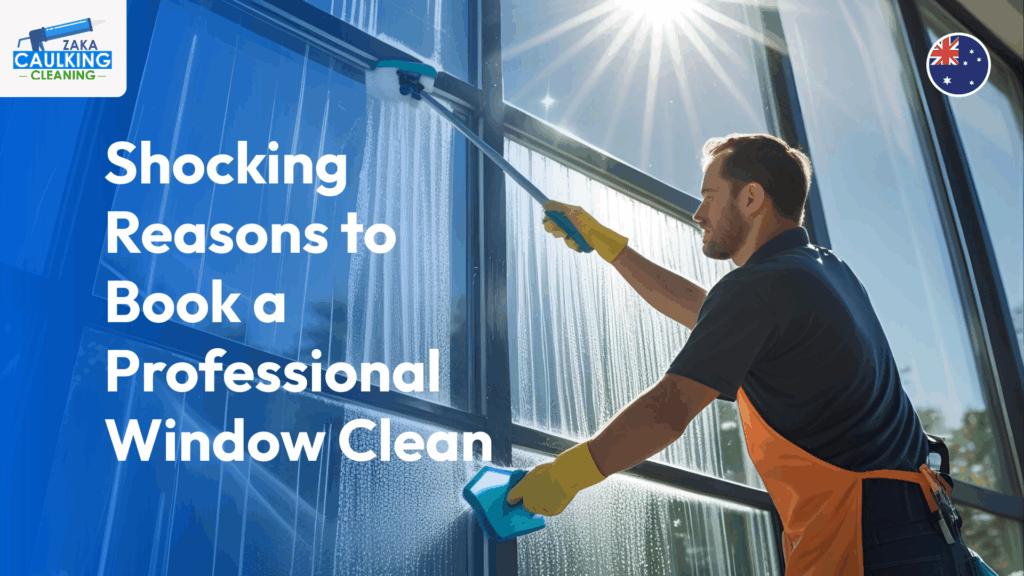
You wipe down the kitchen counters. Vacuum the floors. Even scrub the bathroom tiles every week. However, how recently have you given your windows any thought? Professional window cleaning isn’t just about appearances. Your health, your energy costs, and even the longevity of your property are all impacted. In a world where every detail counts, dirty windows could silently be chipping away at the value of your most important investment: your home. Let’s examine why this service is essential rather than optional. 1. Why Professional Window Cleaning Matters More Than You Think Clean windows do more than shine. They invite light, improve indoor air quality, and create a healthier, more vibrant space to live and work. Enhanced Curb Appeal (And First Impressions) One of the first things that visitors notice about your house or place of business are your windows. Smudges, dust, and hard water stains silently dull your property’s charm. To restore clarity and sparkle, expert cleaners employ eco-friendly chemicals and streak-free methods. Real Story: One Sydney homeowner reported getting 15% more views on their real estate listing just after a professional window clean. Better Natural Light and Mood Because dirty windows restrict sunlight, there is a slight haze within. Regular window cleaning allows maximum natural light, boosting your mood and lowering your dependence on artificial lighting. Extend the Life of Your Windows Pollution, salt air (especially in coastal areas), bird droppings, and hard water can corrode glass over time. Professional cleaners can prevent permanent damage like etching, pitting, or frame rot. According to the International Window Cleaning Association, regular maintenance extends glass lifespan by 20% or more. 2. Health Benefits You Probably Didn’t Expect Reduces Allergens and Mould Dust, pollen, and spores collect in window sills and tracks. Over time, this buildup can aggravate asthma and allergies. Professional cleaning includes deep scrubbing of frames, sills, and flyscreens—not just the glass. Improves Indoor Air Quality Clean windows equal better ventilation. Open windows circulate fresh air more efficiently when the surrounding area is free of grime, pollutants, or insect debris. 3. The Financial Sense Behind It All Save Time, Money, and Risk DIY window cleaning often requires ladders, tools, time, and know-how. Professional services have the right equipment, like water-fed poles and purified water systems, to clean safely and efficiently. Here’s how you save: DIY Costs Professional Cleaning Ladder: $200+ Equipment included Cleaning Supplies: $50 Safe, eco-friendly products Time: 4+ hours Done in 1 hour Bonus: Professionals also spot window issues early, like seal failure or tiny cracks before they become costly. Increases Property Value Whether you’re selling, renting, or refinancing, well-maintained windows signal a well-maintained property. In real estate, details matter—and clean windows sell homes faster. Why Zaka Caulking & Cleaning Is Trusted Choice At Zaka Caulking & Cleaning, we specialize in internal and external professional window cleaning, using environmentally friendly products and industry-grade tools. Whether it’s a high-rise or a single-level home, we leave windows gleaming, every time. Book your window refresh today. Your home (and lungs) will thank you. Final Thoughts: Professional window cleaning isn’t about luxury. It’s about taking control of your space, health, and investment. The clarity you gain isn’t just visual—it’s mental and emotional too. Stop looking through dirty glass. See your home in its best light. Visit zakacaulkingcleaning. for expert service. Builders Clean Window Cleaning Internal Caulking External Caulking FAQs Q: How often should windows be professionally cleaned? For most homes, twice a year is ideal. In dusty areas or near the ocean, every 3-4 months is recommended. Q: Are window cleaning services safe for pets and gardens? Yes. At Zaka Caulking & Cleaning, we use non-toxic, biodegradable cleaning solutions that are safe for kids, pets, and plants. Q: Do professionals clean both sides of the window? Of course. We clean the screens, sills, and tracks as well as the interior. Q: What’s the best time for window cleaning? A: Spring and autumn are ideal, but homes near the ocean or dust may need more frequent cleaning. Q: Can clean windows lower energy bills? A: Yes, they let in more sunlight, reducing the need for lights and heating.
The Shocking Truth About Dirty Windows and Your Health
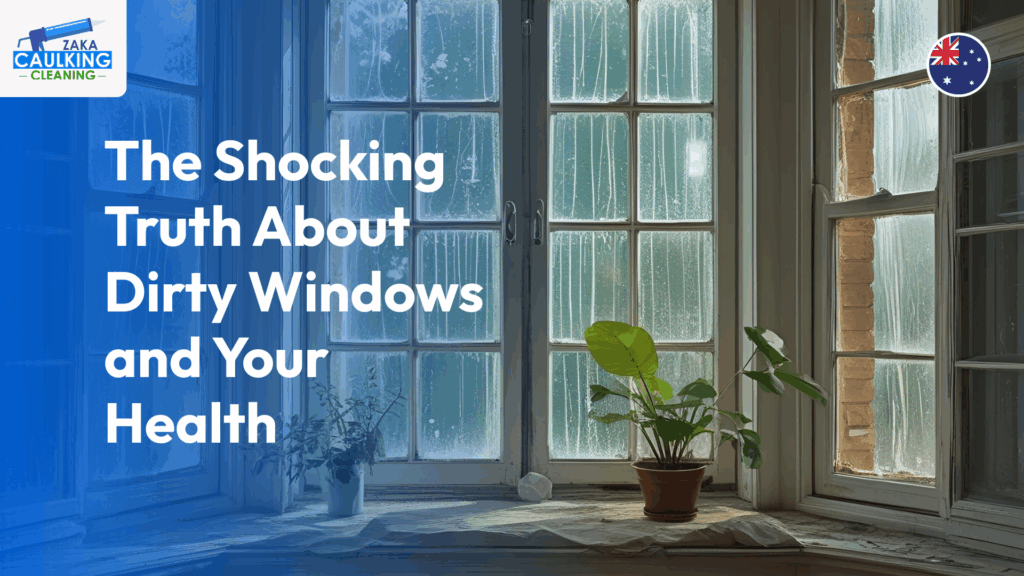
You probably don’t think twice about them. But dirty windows are quietly draining your well-being, money, and peace of mind. They block sunlight, trap harmful allergens, and silently chip away at your home’s value. The worst part? It’s usually too late before most people even recognize it. In this article, we reveal 7 shocking ways dirty windows affect your health, wealth, and mindset. Whether you’re a homeowner or run a commercial property, understanding these consequences could save you thousands—and even improve your family’s health. Zaka Caulking & Cleaning offers professional caulking and window cleaning services if you’re in Sydney and need assistance. 1. Dirty Windows Worsen Indoor Air Quality How Mould and Pollutants Build Up When windows are neglected, dust, mould spores, pollen, and airborne bacteria build up on the glass and surrounding frames. Moisture trapped near seals or frames creates the perfect environment for mould growth. Common Health Symptoms from Dirty Windows: Coughing or sneezing indoors Frequent headaches or fatigue Skin irritation or eye discomfort Aggravated asthma or allergies A recent Mayo Clinic study found a strong link between household mould and respiratory issues. 2. Your Mental Health and Mood Are Affected Natural light improves mental clarity, elevates mood, and supports healthy sleep cycles. Dirty windows block up to 40% of sunlight, reducing natural light exposure and increasing risks of Seasonal Affective Disorder (SAD). Realness Check: Even on a bright day, picture waking up in a room that seems depressing. That emotional dullness could be traced back to nothing more than a foggy window. 3. Higher Energy Bills Poor Light and Insulation = Energy Waste When less sunlight enters your home or office, you turn on lights sooner and longer. Also, dirty or cracked window seals lead to poor insulation, making heating and cooling systems work overtime. Table: Dirty Windows vs Energy Costs Issue Effect Estimated Cost Impact Blocked sunlight More artificial lighting needed +15% lighting bill Seal damage More heating/cooling usage +25% energy bill 4. Decreased Property Value & Curb Appeal Curb appeal influences how you and other people view your house or place of business on a daily basis, so it’s not just for selling. Clean windows signal maintenance, care, and pride. Dirty ones suggest neglect. Real Estate Agent Insight: Professionally cleaned windows frequently increase the price and speed at which a home sells. 5. Damage to Window Glass and Frames Neglected windows accumulate mineral deposits, acid rain residue, and abrasive particles that can scratch glass over time. Frames, especially wood or aluminum, can also rot or corrode due to trapped moisture. Signs of Damage to Watch For: Cloudy or streaked panes even after cleaning Warping or soft window frames Black spots on seals 6. Increased Risk of Pest Infestation Dirt attracts pests. Ants, spiders, and cockroaches can enter through damp and unmaintained window spaces. Tips to Avoid Pests: Clean window tracks regularly Ensure seals are intact Remove moisture buildup 7. DIY Cleaning Risks vs. Professional Results Why Going DIY Might Cost You More Scratching glass with the wrong materials, falling off ladders, or using harsh chemicals are just a few risks of DIY window cleaning. Employing Zaka Caulking & Cleaning, a reputable wndiow cleaning company, guarantees: Safe, streak-free cleaning Inspection for seal and frame damage Long-term protection against rot and mold Final Thoughts: Clarity is More Than a View Clean windows maintain the value of your home, improve your mood, and safeguard your health. Ready to see clearly again? Trust the experts at Zaka Caulking & Cleaning for safe, reliable, and affordable window cleaning in Sydney. FAQs: Q: How often should I clean my windows? A: Residential homes: every 3-4 months. Commercial properties: monthly or quarterly. Q: Can dirty windows affect indoor plants? A: Yes. Less sunlight reduces plant growth. Q: What’s the best time of year to clean windows? A: The best seasons for weather and pollen levels are spring and fall. Q: Do dirty windows cause permanent damage? A: Yes, they can lead to mould, scratches, and frame rot over time. Q: Is hiring a pro window cleaner worth it? A: Yes, it saves time, prevents damage, and gives better results.
How Often Should You Clean Windows?
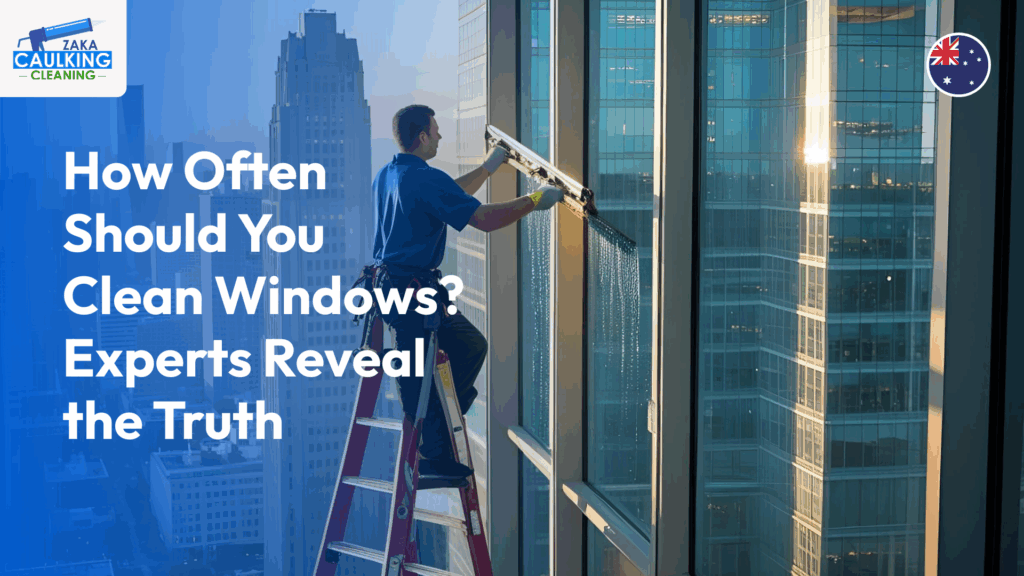
Have you ever wondered how frequently windows should be cleaned? It’s more than just clearing dust, it’s about letting sunshine into your life and protecting your investment. Visitors to Zaka Caulking & Cleaning often ask this exact question, especially those with coastal homes or allergy concerns. We’ll break down exactly how often Should You Clean Windows, using proven best practices and real stories. 🌍 Context: When Frequency Depends on Climate & Lifestyle Why Frequency Varies Coastal vs inland wind and salt exposure Urban pollution vs rural dust Levels of pollen, tree debris, and bird droppings Personal habits—kids, pets, busy households Last autumn, a client in Byron Bay cleaned monthly after discovering salt spray etched their window frames. Proactive cleaning saved them from costly glass replacement. 📅 Seasonal Window Cleaning Schedule Season Environment Recommended Frequency Spring Pollen & rain streaks Biannual homeowners; monthly commercial services Summer Dust, fingerprints, salt Coastal homes: quarterly; interior monthly with pets Autumn Leaves & debris Clean at start & before winter Winter Condensation & hard-water stains Mid-winter clean for bright spaces 🧱 Core Factors Determining Cleaning Frequency (User Intent Aligned) Window Material & Frames: Wooden frames need gentle care; aluminum resists grime better. Residential vs Commercial: Homes typically want quarterly maintenance; shops need monthly sparkle. DIY vs Professional Approaches DIY: Squeegees, eco cleaners, microfiber cloths Professional: Water-fed poles, purified water, streak-free guarantees I once DIY-cleaned my lounge windows with vinegar, and ended with streaks. A pro visit used polished tools and eco solution, instant clarity. ⚠️ Mistakes to Avoid When Cleaning Windows Effort overload: Scrubbing too hard can scratch glass. Wrong timing: Rain finishes can cause grime; UV heat causes streaks. Harsh cleaners: Use gentle, glass-safe products—especially near glazed or tinted windows. 🔍 How Dirty Is “Too Dirty”? Signs to Act Now Streaks and water spots Condensation that won’t wipe Dullness or reduced natural light Sticky window frames When you see these signs, it’s time to clean rather than waiting to tick off the calendar. 🔧 DIY vs Pro Clean: Pros, Cons & Frequency Guide DIY Approach Tools: Squeegee, microfiber cloth, eco cleaner Frequency: Interior monthly; exterior quarterly Best for easy-to-reach windows Professional Cleaning Tools: Purified water systems, pole feed, safety-trained staff Frequency: Residential—2×/year baseline; Coastal/commercial—quarterly or monthly Ideal when dealing with high-rise or hard-to-reach windows Book bespoke cleaning with Zaka Caulking & Cleaning and get a tailored, eco-friendly schedule and estimate. 💚 Bonus: Eco-Friendly & Health-Driven Cleaning Tips Opt for plant-based or vinegar solutions Windows should be maintained to improve indoor air quality, which is important for managing allergies and asthma. According to the EPA, keeping indoor air clean can reduce illness rates by up to 30%—clean windows play a part! By default, clean your windows twice a year, and adjust based on your climate, property type, and lifestyle. Coastal homes, allergy households, and businesses should aim for quarterly to monthly maintenance. For a stunning, eco-conscious clean with professional-grade results, contact Zaka Caulking & Cleaning—we’ll build your ideal schedule, restore clarity, and protect your view year-round. 🤔 FAQs Q1: Should you clean windows before or after rain? Always clean after the rain stops—avoids streaks caused by early drying. Q2: How often should allergy-prone homes clean their windows? Monthly interior cleaning and quarterly exterior washes help reduce pollen buildup and improve air quality. Q3: Can over-cleaning damage my windows? Yes, strong chemicals or abrasive instruments can erode seals or scratch glass. Stick to gentle methods and use soft cloths.
